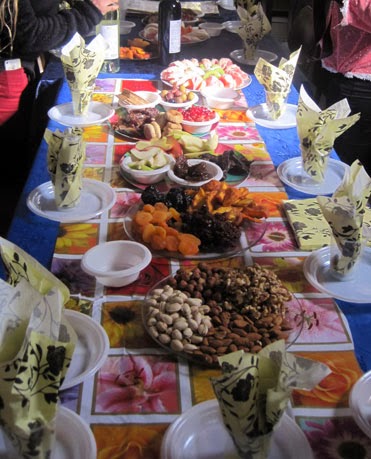The mitzvah of “Bal Tashchit” and Environmental Awareness
Introduction
 |
| Our Tu B’Shevat Seder table |
Since the Month of Shevat celebrates the New Year of the Trees, and the general mitzvah of “Bal Tashchit” not to destroy and waste is learned out from the prohibition of cutting down fruit trees,[1] it has become a custom to emphasize this mitzvah especially during the month of Shevat. Being a second generation holocaust survivor I very much relate to the mitzvah of avoiding waste. It is especially against my nature to throw out any food worthy of human consumption. Even my leftovers which are no longer fit for people to eat go into my special compost bin to the very last crumb. Luckily I have chickens to feed all my leftovers except chicken and meat, which the cats will happily fight over.
I heard s a story about Rav Kook to which I especially relate. While walking with Rabbi Avraham Yitzchak Kook, Reb Aryeh Levin picked a leaf from an herb or flower. Rabbi Kook was shocked and mildly rebuked him, saying that we must take great care not to uselessly pick anything that could grow or sprout because every blossom praises Hashem and every stone whispers a secret. The entire creation sings.[2] Hashem created everything in the ecosystem with its own purpose, nothing goes to waste I try to by refill rather than new bottles of cleaning agents, and of course always write on both sides of the paper in order not to waste trees. Since reemerging from exile, we Jews need to redefine our relationship with the physical reality and learn to live in harmony with our land and environment.
Read on to learn Torah sources on environmental consciousness, as well as practical tips for reduce and re-use.
Shift of Consciousness in the Torah World
We live in very exciting times when the Torah and its adherents are remerging from exile. Within the cruel oppression of our long exile, we have mainly been preoccupied with preserving our spirit. Having as little interaction as possible with the physical world was idealized by our European ancestors from the ghetto. When the material overflow from Western industrialization permeated our Torah observant communities, we had no tools to deal with the material excess that streamed into our supermarkets and malls, eventually finding their ways into our kitchens, closets, dining-rooms, and cars.
Returning to our Land and Reevaluating our Relationship with the Earth
One of the major signs of the process of “Geula” (redemption) is the renewed awareness by Torah observant communities of how to relate to our physical environment. Now that we are returning to our own Land, the time has come to reevaluate our relationship with the Earth, and to start keeping the Torah laws that relate to the importance of recycling, minimizing waste and protecting the environment.
The Mitzvah “Do not Waste” From the Torah
There are several sources found in Tanach, Midrash and Halacha that stress the importance of protecting the environment. Our sages expanded the Torah prohibition of “Bal Tashchit” – “do not destroy”[3] – to include all waste, destruction and vandalism of any nature. Maimonides summarized the prohibition as “Take from nature what you need, but do not destroy it!”[4] He equates unnecessary destruction with “every evil thing” and explains that righteous people who inspire others to come close to the Torah must develop a higher sensitivity and love for everything good in Hashem’s world.
Sefer Hachinuch makes a connection between character development and avoiding even the slightest waste:
“The prohibition of destroying fruit-trees during a siege and likewise, all destruction is included in this prohibition. The root of the mitzvah is known to teach our souls to love what is good and useful and to subsequently cleave to it; through this, the good will cleave to us and we will distance ourselves from every evil thing and every destruction (waste). This is the way of people of good deeds who love peace, rejoice in the good of creation and bring everyone close to the Torah. They do not destroy anything – even a mustard seed – and it troubles them to encounter any destruction or harm. If they can act to save anything from destruction, they use their entire strength to do so.”[5]
The midrash expands this concern to preserve every part of G-d’s creation in nature to the mitzvah of safeguarding the whole world. It warns us not to destroy our planet Earth!
“At the time when Hashem created the first human being, He showed him each of the trees in the Garden of Eden and told him: ‘See my works how good and excellent they are! Now all that I created is for your sake. Think upon this. Do not corrupt or destroy My world. For if you destroy it, there will be no one to restore it after you.’”[6]
Stop Abusing the Resources of the World
How timely is this warning from our ancient classical sources dating back to the 9th century! Unfortunately we human beings did not sufficiently heed Hashem’s warning in our selfish striving for individual material profit. We have neglected to consider the consequences of our abuse upon the world’s physical resources on the greater whole and, as a result, we have wreaked irreparable havoc on our planet Earth.
Most surveys into the state of our world conclude that human activities threaten the Earth’s ability to sustain future generations. The way society obtains its resources has caused irreversible changes that are degrading the natural processes supporting life on Earth. Our abuse of its food, fresh water, timber, fiber and fuel over the past fifty years has seriously degraded the environment.
“Love Your fellow like yourself” Necessitates Environmental Consciousness
The following Midrashic anecdote teaches us an important lesson in environmental consciousness: A man was cleaning out the rocks and rubble from his field into the public area. A person passing by asked him: Why do you remove rocks from the place that is not yours and put them in the place that is yours? The man was dumbfounded by this question, and didn’t understand its meaning until one day many years later. After having become impoverished and lost all of his land, the man was once walking in the communal area and stumbled over a big rock. When he recognized the rock as one of those he had cleared out of his field many years ago, the meaning of the question dawned on him. Now that he was a pauper, without his own land, the communal area was all he shared a part of.[7]
Rabbi Akiva teaches us that the main principle of the Torah is “love your fellow as yourself.”[8] This principle includes considering the consequences of our actions, not only in our own lives but also in the lives of our fellow human beings throughout future generations. For example, this includes considering the consequences of using air fresheners that damage the ozone layer. While it may provide us with an immediate benefit, we should expand our awareness to consider the fact that our grandchildren may someday experience its damaging consequences.
Talmudic Wisdom is Foresight
We live in an era of instant gratification. The Western “consumer culture” persuades us to concern ourselves with our own immediate comfort without considering its future consequences. In contrast, the Talmud teaches us: “Who is a wise person? Someone who sees what is being born!”[9] It is, therefore, our Torah responsibility to consider the future impact on the environment of our current lifestyles and uses of the earth’s resources. With this foresight, we will curtail unnecessary air-pollution by carefully selecting, buying and using environment-friendly products. Moreover, we must make an effort to compost and recycle rather than to throw everything away. Otherwise, in the near future there will no longer remain any place called “away.”
Practical Tips for Reduce and Re-use
Here are a few tips for avoiding waste. Since plastic is a material that does not decompose, we need to minimize its use. A simple way to make a difference is to reuse plastic bags over and over. For example, instead of taking new plastic bags from the supermarket, we can bring our own bags from home.
Water is a valuable resource and with a bit of mindfulness we will find many opportunities to conserve it. For example instead of wasting the water in the shower while it’s warming up to a comfortable temperature, we can use the running water to fill a couple of netilat yadayim cups. Extra left over water in tea kettles, cups and vases can be used to water the plants. Washing plastic bins, netilat yadayim cups, and muddy boots can likewise be done outside while simultaneous watering the grass.
Composting can be understood as a “Hidur Mitzvah” (The highest way of glorifying the mitzvah) of “Bal Tashchit” (The prohibition against destruction and waste). Recycling is a basic yet important way of engaging ourselves in the Jewish goal of Tikun Olam – (repairing of the world). By recycling, we can elevate even the “lowest” aspects of our physical world, reconnecting to their higher capacity sparks of holiness and purpose within each element that we work with.
Spirituality Implies Having a Proper Relationship with the Physical Environment
We are obligated in the mitzvah of emulating G-d, as it states, “And you must walk in His ways.”[10] Just as Hashem does not waste, so we must learn to live in harmony with the physical world and to use its resources with the utmost purpose and with great care. The many advertisements in our consumer society attempt to convince us to purchase goods in excess; yet, we may discover that we really only need a small fraction of all those products.
As Torah Jews bound by the mitzvoth of “bal Tashchit”, and “love your fellow like yourself” we need to have the foresight to find ways of repairing our world. We must begin to take responsibility for the consequences that our actions have on the environment. Following the rule, “Reduce and re-use” is a first step.
As Jews who are striving to live according to the Torah’s precepts, we need to be in the forefront of preserving the world that Hashem entrusted into our stewardship. Let us set an example in our personal life by affirming that true spirituality entails actively caring for our physical environment.
Keeping Hashem’s mitzvot of preserving the Earth: isn’t it worth the extra effort?
[1] Devarim 20:19.
[2] Related by Rabbi Danny Landes about his great-uncle, Reb Aryeh Levin.
[3] Devarim 20:19.
[4] Mishneh Torah, The Laws of Kings 6:8-10.
[5] Sefer Hachinuch – The Book of Education, Mitzvah 529.
[6] Midrash Kohelet Rabbah 7:19.
[7] Based on Midrash Kohelet Rabbah 6:10.
[8] Midrash Bereishit Rabbah 24:7.
[9] Babylonian Talmud, Tamid 32a.
[10] Devarim 28:8.
http://www.voices-magazine.com/#

Wonderful!
Sounds good.Has Beerot stopped using plastic disposable dishes? In the picture of the Tu B'Shvat Seder,it sure looked like…Oops!